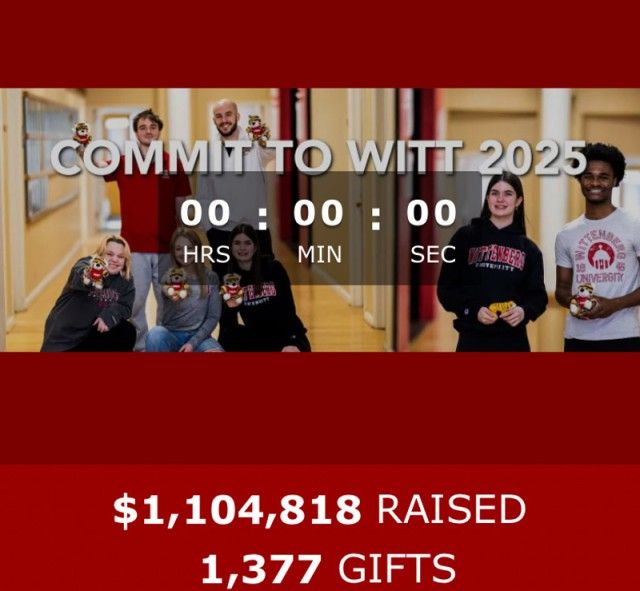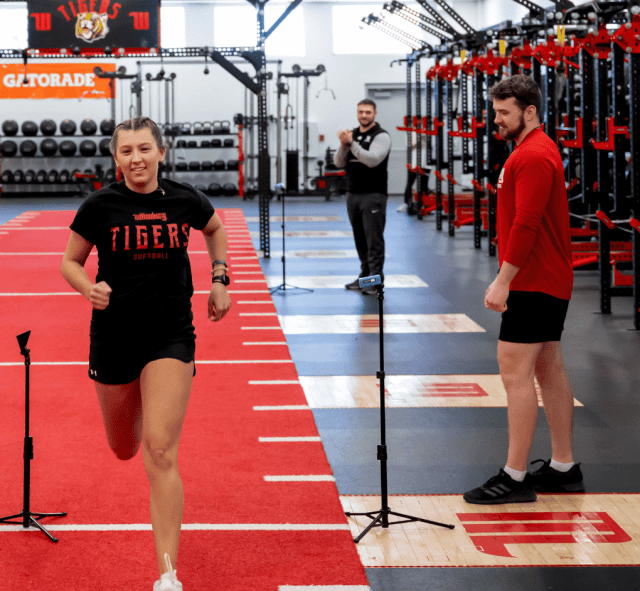Excitement is building on Wittenberg’s campus as the University gears up for the Great North American Eclipse on Monday, April 8. Springfield, Ohio, will have a front row seat to this once-in-a-lifetime event.
For four minutes across a 115-mile path stretching from Mexico to Maine, the sky will darken as the moon passes between the Sun and the Earth during this astronomical event. Wittenberg is positioned perfectly in the path of totality as it hosts WittClipse 2024. To help understand all that will transpire, Wittenberg's award-winning Professor Emeritus of Physics Dan Fleisch, who specializes in electromagnetics and space physics, including astronomy, will lead several conversations in print and in-person as the big day nears. He is also responsible for inviting nationally known astronomer, educator, author, public speaker, TV/radio presenter, and podcaster Dean Regas to campus for a kickoff event at 7 p.m., Saturday, March 2 in Bayley Auditorium, inside the Barbara Deer Kuss Science Center.
Regas brings the complicated universe down to earth, which he will do during this free, all-ages astronomy presentation titled "Tour of the Universe: You Are Here." Join Regas in rocketing through space and sailing among billions of stars and galaxies. Utilizing state-of-the-art simulation software, Regas will guide participants through the mind-boggling scale of the universe. Along the way, participants will stop at the Moon and individual planets before making the jump to light speed and heading to interstellar space to see all the galaxies in the universe.
The event is open to the public and will be followed by a sky tour and telescopic observing at Wittenberg's Weaver Observatory (skies permitting).
According to his website, Regas served as the astronomer for the Cincinnati Observatory from 2000-2023 and is the author of six books including 100 Things to See in the Night Sky and How to Teach Grown-Ups About Pluto. From 2010-2019, Regas was the co-host of the PBS program Star Gazers and has contributed to Astronomy Magazine, Sky and Telescope Magazine, Farmer's Almanac, USAToday, Science Friday, and Here & Now. Regas is also the host of the popular astronomy podcast called Looking Up with Dean Regas. He and Fleisch each served as Astronomers in Residence at Grand Canyon National Park in Arizona at different times.
Regas’ presentation will provide a great introduction for the presentations Fleisch has planned for the weeks leading up to the eclipse. The topics and astronomical presentations are as follows and will take place at 1 p.m. on Sundays in Weaver Observatory beginning March 10. His presentations will also be featured in the Springfield News-Sun with accompanying articles by Tom Stafford, Wittenberg class of 1976.
- March 10 - Galaxies
- March 17 - Stars
- March 24 - Planets
- March 31 - Cathedrals as Solar Observatories
- April 6-7 - Total Solar Eclipse Viewing Tips and Safety
Fleisch has also developed an accurately scaled model of the solar system, which has been installed on campus and at select locations in the surrounding community. The models consist of 15 planetary information stations all located at the proper distance from the model Sun, which is represented by a three-foot sphere in the Edwards-Maurer Field, part of the Health, Wellness & Athletics Complex.
“Each planetary information station includes a large placard with information about the planet or asteroid at that location, along with an accurately scaled model of that planet.,” Fleisch said. “The stations for the Sun, Mercury, Venus, Earth/moon, Mars, Jupiter, and several asteroids are on Wittenberg campus, but Saturn, Uranus, Neptune, and Pluto are so far away from the Sun that they don't fit on campus.”
Happily, surrounding organizations have agreed to host stations for Fleisch. The Springfield Museum of Art is featuring Saturn, the Clark County Public Library is hosting Uranus, and the Westcott House will be home to Neptune and Pluto.
Fleisch will be visiting several local and regional schools and service organizations to present information about the Sun, the eclipse, and how people can make sure that they view the eclipse safely. Current engagements include multiple presentations at Horace Mann, the Kiwanis Club, the Dayton Regional STEM School, and the University Club.
Recipient of the 2004 Alumni Association Award for Distinguished Teaching and the 2010 Ohio Professor of the Year, Fleisch is one of the top 25 science, technology, engineering, and mathematics (STEM) professors in Ohio (read complete bio). Named the Outstanding Faculty Member at the Wittenberg Greek Scholarship Awards in 2000, he also won the Omicron Delta Kappa Award for Excellence in Teaching in 2002. In 2003 and 2005, he was recognized for Faculty Excellence and Innovation by the Southwestern Ohio Council for Higher Education (SOCHE), which recently changed its name to the Strategic Ohio Council for Higher Education. Late last year, he also received the exciting news that the International Astronomical Union Working Group Small Body Nomenclature (WGSBN) voted to name a minor planet in the asteroid belt “17037 Danfleisch.”
Fleisch received his B.S. in physics from Georgetown University and his M.S. and Ph.D. in space physics and astronomy from Rice University. He is a best-selling author, penning six books thus far with Cambridge University Press, including the co-authored work A Student's Guide to the Mathematics of Astronomy with 2001 Wittenberg alumna, astronomer, writer, and professor Julia Kregenow, and his latest releases, A Student's Guide to the Schrödinger Equation and A Student’s Guide to Laplace Transforms. His other books include A Student's Guide to Maxwell's Equations, published by Cambridge University Press in 2008, and A Student's Guide to Vectors and Tensors, published by Cambridge in 2011. Additionally, he co-authored with 2005 Wittenberg physics graduate Professor Laura Kinnaman of Citrus College, A Student's Guide to Waves, published by Cambridge in 2014 and the McGraw-Hill textbook Electromagnetics with Applications with late professor John Kraus of The Ohio State University. Fleisch's student guides have become international best-sellers and have been translated into Japanese, Korean, Chinese, and Italian.
On campus, leveraging its position along the path, WittClipse is the brainchild of a committee comprised of experts in astronomy, meteorology, climate change, physics, and more, who have joined together to present a series of activities and events to mark this phenomenon. A range of activities are scheduled to take place from 11 a.m. to 4 p.m. on April 8 at Edwards-Maurer Field, weather permitting. Fun, interactive games, and food are also expected to be offered in and around the stadium. More information will be forthcoming once more details are confirmed.
Wittenberg will have safety glasses available for the campus community. For more information about eye safety and the eclipse, visit https://eclipse.aas.org/safety.
Planning is currently underway, so check back often to see the latest on this comprehensive educational event covering the full spectrum of learning by clicking here.







